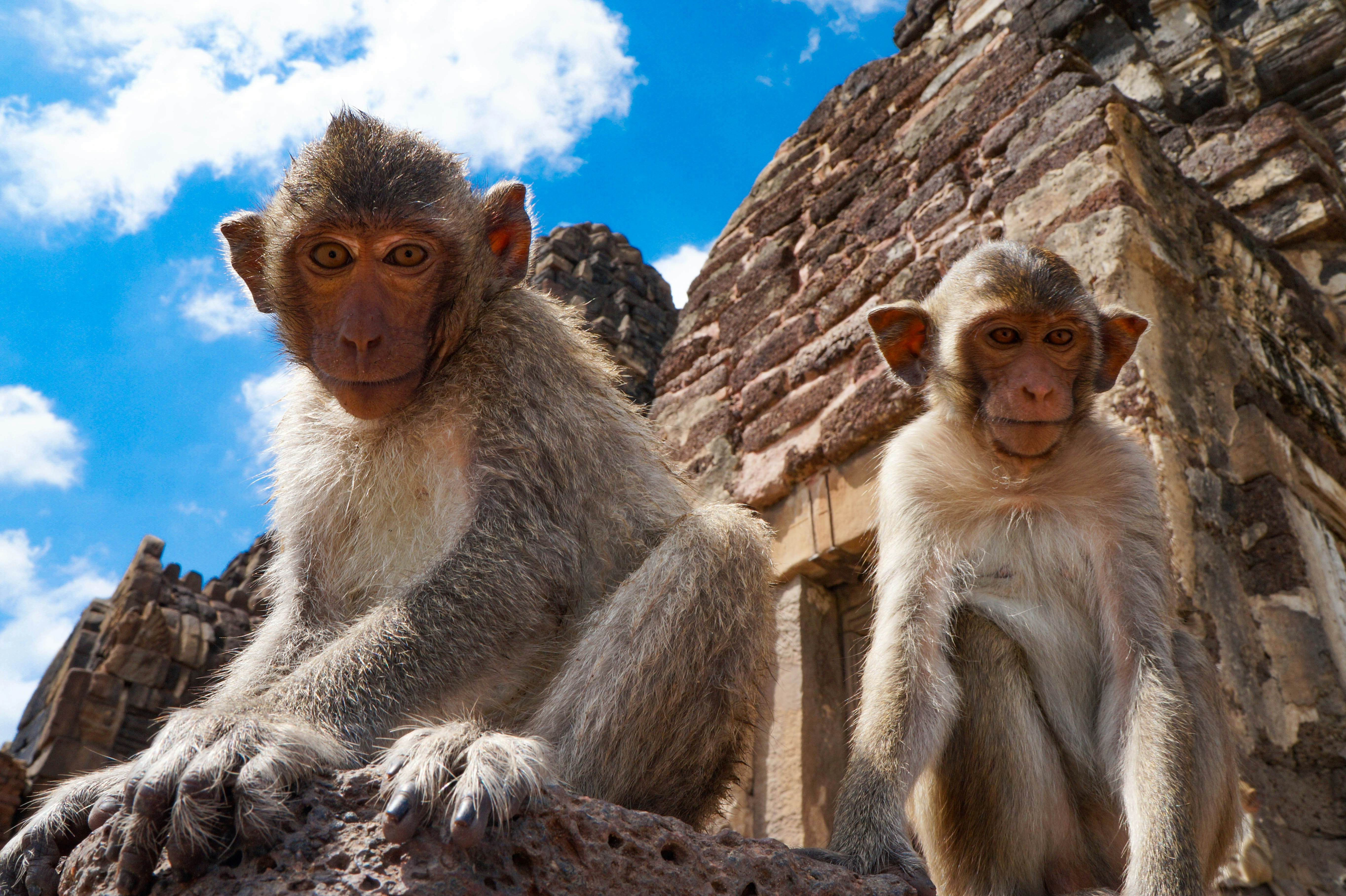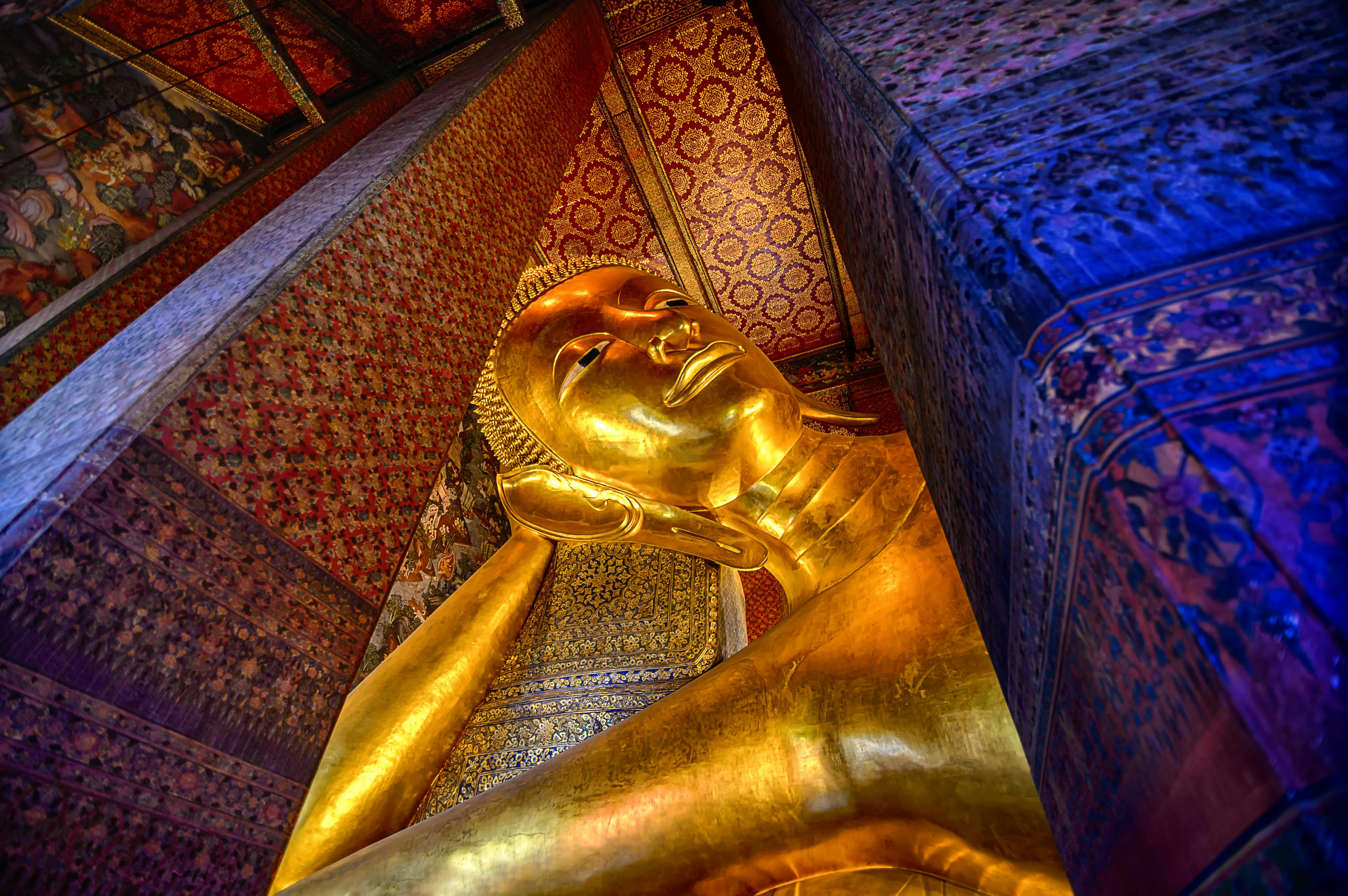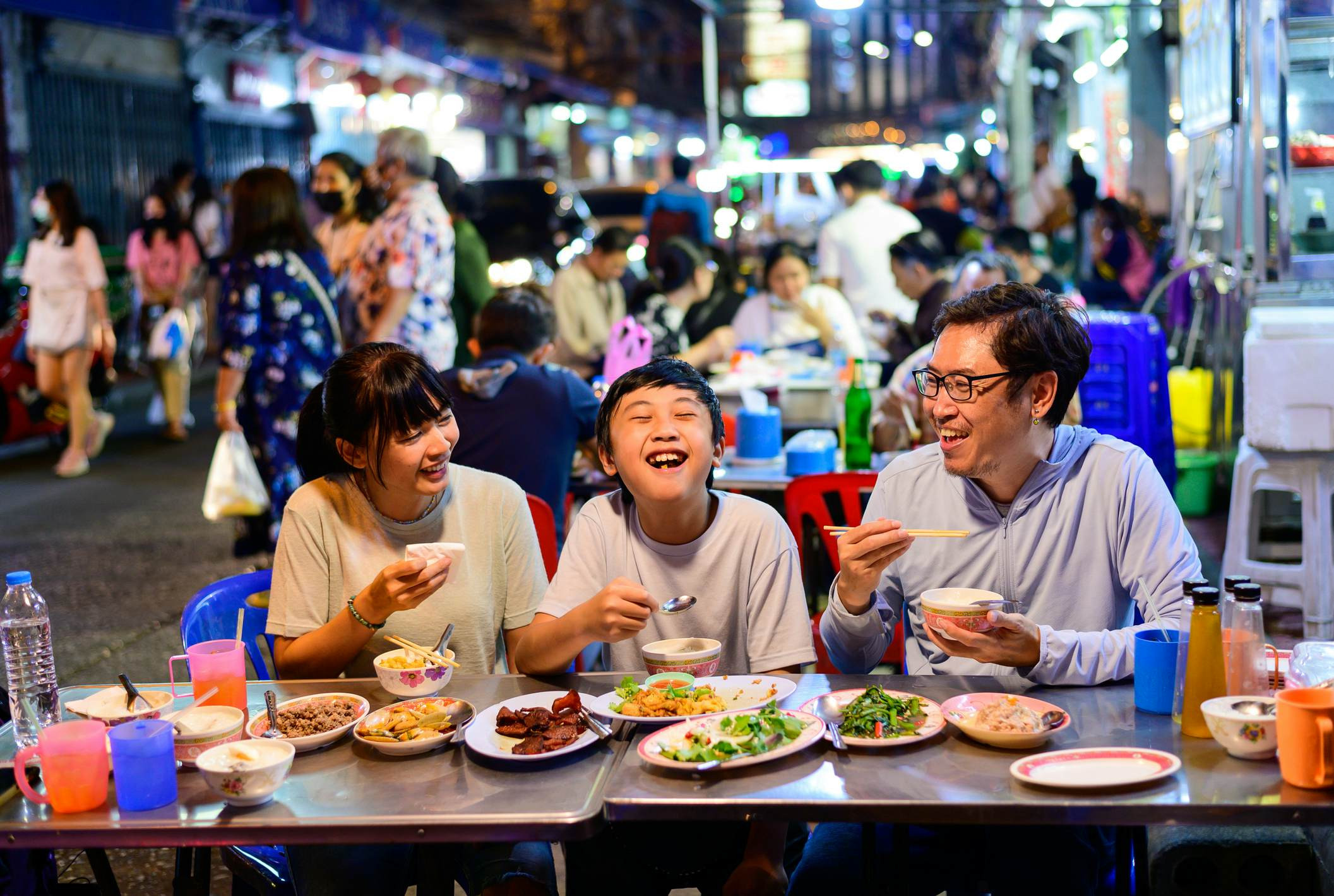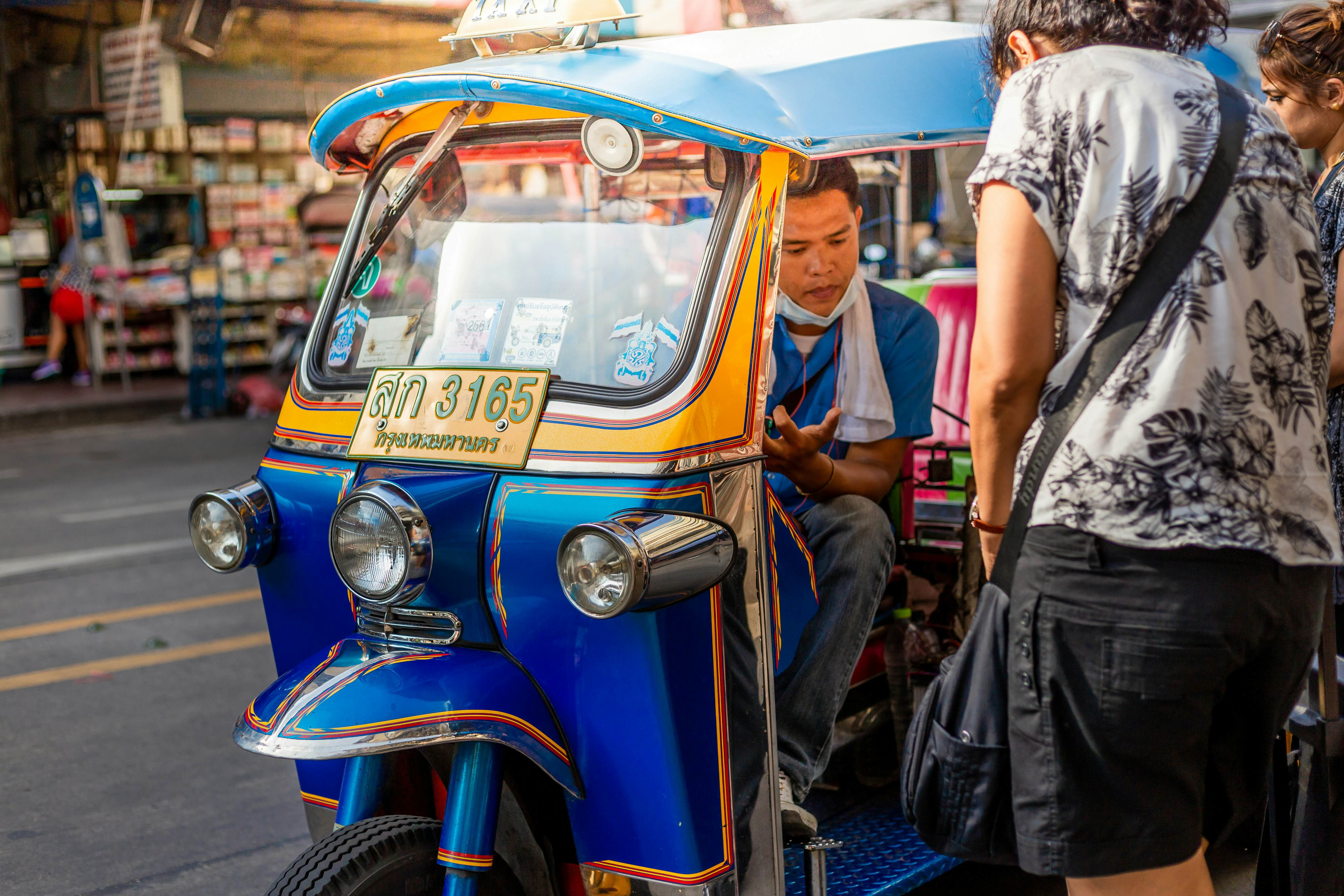Traveling to Thailand is an exciting adventure, and knowing what to expect can make your trip even smoother. SIXT.VN is here to help you prepare for your journey, offering essential tips and advice for an unforgettable experience. From understanding the weather patterns to respecting local customs, we’ve got you covered. Let’s explore what you need to know before you embark on your Thai adventure, including travel tips, cultural insights and travel requirements.
1. Understanding Thailand’s Diverse Rainy Seasons
Thailand’s rainy season varies depending on the region. Northern, central, and southwestern Thailand experience heavy showers and storms from June to October, potentially making sea travel hazardous. The southeast coast and the Gulf of Thailand see rain slightly later, from October to December.
- Impact on Travel: Lower prices and fewer crowds are typical during the rainy season, but some accommodations may close, and ferry services, including those to the Tarutao archipelago, may be suspended.
- Preparation: Pack wet weather gear if visiting during these months.
Did you know? According to the Tourism Authority of Thailand (TAT), the shoulder seasons (April-May & September-October) often offer a sweet spot with fewer tourists and pleasant weather in many regions.
2. Essential Vaccinations and Health Precautions
Before traveling, ensure you are up-to-date on recommended vaccinations to protect your health.
- Recommended Vaccinations: Doctors often recommend vaccinations against tetanus and hepatitis A. Consider a rabies shot due to potential exposure from dogs, cats, and monkeys.
- Malaria Risk: Malaria is present along the borders with Laos, Cambodia, Myanmar, and Malaysia. If visiting these areas, use anti-malarial prophylaxis or take precautions to avoid mosquito bites.
- Health Tip: According to the World Health Organization (WHO), travelers should consult their healthcare provider 4-6 weeks before travel to ensure they receive all necessary vaccinations and health advice.
 Monkeys on a temple in Lopburi, central Thailand
Monkeys on a temple in Lopburi, central Thailand
Alt: Monkeys at a historic temple in Lopburi, Thailand, reminding travelers to consider rabies vaccinations due to potential animal encounters.
3. Booking Activities and Accommodations in Advance
To ensure you get to experience specific activities and accommodations, especially during peak tourist seasons and religious holidays, it’s best to book ahead.
- Peak Season: The busy tourist season runs from November to March.
- Rainy Season: Always confirm that establishments are open by calling or emailing ahead during the rainy season.
- SIXT.VN Tip: Let SIXT.VN handle your bookings. We offer a variety of options, from boutique stays to comprehensive tours, ensuring you get the best experience without the hassle.
4. Understanding Thai Greetings and Etiquette
Knowing how to greet people and behave respectfully is crucial for a positive cultural exchange.
- The Wai: The standard greeting is the wai, a respectful bow with hands pressed together in front of the chest.
- Physical Contact: Avoid shaking hands unless initiated by the other person.
- Home Visits: Remove your shoes before entering a Thai home. Avoid pointing the soles of your feet towards anyone.
- Cultural Insight: According to research from Chulalongkorn University’s Faculty of Arts, understanding and respecting Thai customs can significantly enhance interactions with locals.
5. Showing Respect for Buddhism
Buddhism is integral to Thai culture, and showing respect is paramount.
- Temple Etiquette: Remove footwear before entering any Buddhist structure. Dress modestly, covering shoulders, upper arms, and upper legs.
- Behavior: Never point the soles of your feet towards a Buddhist image or monk. Do not touch Buddha statues on the head.
- Monks: Give way to monks on footpaths and avoid sitting next to them on public transport. Women should not touch monks or their belongings.
 The Reclining Buddha inside the Wat Phra Chetuphon Vimolmangklararm Rajwaramahaviharn in a Buddhist temple complex of Wat Pho in the Phra Nakhon District, Bangkok,
The Reclining Buddha inside the Wat Phra Chetuphon Vimolmangklararm Rajwaramahaviharn in a Buddhist temple complex of Wat Pho in the Phra Nakhon District, Bangkok,
Alt: The Reclining Buddha at Wat Pho in Bangkok, Thailand, symbolizing the importance of respecting Buddhist customs when visiting temples.
6. Dressing Appropriately
Modest attire is appreciated in Thailand, particularly at religious sites.
- General Guidelines: Avoid revealing outfits. Swimsuits are suitable for the beach, but cover up with a sarong or fisher’s pants away from the sand.
- Religious Sites: Ensure clothing covers shoulders when visiting temples and other religious locations.
- Sunbathing: Topless or nude sunbathing is frowned upon and can attract unwanted attention.
7. Avoiding Disrespect Towards the Monarchy
Respect for the king and royal family is taken very seriously in Thailand.
- Lèse-majesté: Maligned the royal family is a criminal offense.
- Behavior: Never show disrespect towards the monarch or depictions of the royal family, including on money.
8. Understanding Thai Dining Customs
Dining in Thailand involves unique customs that can enhance your experience.
- Serving Style: Dishes are typically served simultaneously and placed in the middle of the table for sharing.
- Utensils: Thailand abandoned chopsticks in the 19th century. You’ll typically use a spoon and fork.
- Sticky Rice: Sticky rice is usually bundled into balls and eaten with your fingers.
 Asian family enjoy eating food on street food restaurant with crowd of people at Yaowarat road, Bangkok
Asian family enjoy eating food on street food restaurant with crowd of people at Yaowarat road, Bangkok
Alt: A family enjoying street food in Bangkok’s Yaowarat Road, highlighting the communal dining experience and diverse culinary offerings in Thailand.
9. Navigating Vegetarian Dining
Vegetarianism can be a relative term in Thailand due to the widespread use of fish sauce and oyster sauce.
- Hidden Ingredients: Fish sauce, oyster sauce, and egg are commonly used in cooking.
- Vegetarian Options: Seek out Indian-owned vegetarian restaurants or those serving kin jay Buddhist cuisine.
- Communication: If unsure, ask if the food is jay. The term mang sà wí rát means food that doesn’t contain pieces of meat or fish, but it may still not be suitable for vegetarians.
- SIXT.VN Suggests: When booking tours or meals through SIXT.VN, specify your dietary requirements in advance to ensure suitable options are available.
10. Managing Health Risks: Stomach Bugs, Mosquito Bites, and Rabies
Travelers should be aware of common health risks and take preventive measures.
- Stomach Bugs: Avoid drinking tap water. Wash hands before eating. Be cautious of ice, unwashed or unpeeled fruit, and uncooked vegetables.
- Medical Care: If unwell, seek out private hospitals in larger cities rather than public hospitals.
- Mosquito Bites: Use mosquito repellent and nets. Mosquito bites can easily become infected.
- Rabies: Seek medical attention if bitten by a dog, cat, or monkey.
11. Understanding Drug Laws
Thailand has strict drug laws, and travelers should be well-informed to avoid legal issues.
- Marijuana: While marijuana and hemp were removed from the Category 5 narcotics list in June 2022, restrictions still apply. Smoking marijuana in public is not recommended.
- Class A Drugs: Crossing borders with Class A drugs carries the death penalty. Possession of even small quantities can result in a hefty prison sentence.
- Smoking: Smoking in public can attract heavy fines.
- Prescription Medicines: Check that any prescription medicines are allowed into Thailand before traveling.
12. Avoiding Inflated Prices
Tourists are often charged inflated prices, especially for transport.
- Tuk-tuks and Taxis: Ask locals for the typical cost of journeys to use as a yardstick for fair fares.
- Tourist Sites: Be wary of cab drivers and touts steering you towards dubious souvenir shops or second-rate accommodations.
- Booking Directly: Book transport directly with operators to avoid unscrupulous travel agents.
- SIXT.VN Advantage: With SIXT.VN, you receive transparent pricing and reliable services, ensuring you avoid inflated costs and scams.
 A driver in a blue and white tuk-tuk, picking up a passenger
A driver in a blue and white tuk-tuk, picking up a passenger
Alt: A tuk-tuk driver in Thailand, reminding travelers to negotiate fares and avoid inflated prices.
13. Being Aware of the Sex Industry
Thailand’s sex industry may find you whether you want it to or not.
- Approaches: Single male travelers (and even couples) may be approached by sex workers or touts.
- Warning Signs: Be cautious of bars, restaurants, and karaoke venues with red or pink strip lights, skimpily dressed staff, and many foreign male customers.
14. Avoiding Political Protests
Political tensions can lead to protests, which are best avoided.
- Potential Disruptions: Protests can lead to blockades, flight cancellations, and violence.
- Stay Informed: Monitor local news sites for information on political troubles and avoid protests.
15. Considering Government Warnings About Travel in Thailand’s South
The far south of Thailand, along the Malaysian border, has ongoing security issues.
- Advisory: Most foreign governments advise against travel to Yala, Pattani, Narathiwat, and parts of Songkhla.
16. Ensuring Proper Insurance for Scooter Riding
Renting a scooter is popular, but it’s crucial to ensure you’re properly insured.
- Driving License: Check that your home driving license covers you for the vehicle you hire.
- Documentation: Carry your passport (or a copy of the ID pages).
- Safety Gear: Wear a helmet and ride cautiously.
- Insurance: Ensure the rental includes liability insurance. Hundreds of tourists are injured in motorcycle accidents each year.
- Road Awareness: Always give way to larger vehicles and watch out for livestock, potholes, and other hazards.
17. Following Local Advice During Natural Disasters
Thailand is prone to natural disasters, so heed official advice.
- Vulnerability: Thailand is vulnerable to earthquakes, tsunamis, flooding, landslides, and cyclones during the rainy season.
- Official Guidance: Heed official advice in the event of a natural disaster and contact your embassy for up-to-the-minute information on evacuation procedures.
- SIXT.VN Support: SIXT.VN provides real-time updates and assistance to travelers during natural disasters, ensuring your safety and peace of mind.
18. Learning Basic Thai Phrases
Knowing a few basic Thai phrases can greatly enhance your interactions with locals.
- Hello: Sawasdee (ครับ/ค่ะ) – Sawasdee krap (for males), Sawasdee ka (for females)
- Thank You: Khop Khun (ครับ/ค่ะ) – Khop Khun krap (for males), Khop Khun ka (for females)
- Excuse Me: ขอโทษ (khǒo thôot)
- How Much: ราคาเท่าไหร่ (ra-kaa thâo rài)
- Where is…: …อยู่ที่ไหน (yùu thîi năi)
19. Exploring Thailand’s Diverse Regions
Thailand offers diverse regions, each with its unique charm.
- Bangkok: The bustling capital city, known for its temples, markets, and vibrant street life.
- Chiang Mai: A northern city surrounded by mountains, offering a more relaxed atmosphere and opportunities for trekking and exploring ancient ruins.
- Phuket: A popular island destination with stunning beaches, nightlife, and water sports.
- Krabi: Known for its limestone cliffs, beaches, and islands, perfect for rock climbing and island hopping.
20. Staying Connected with a Local SIM Card
Having a local SIM card can be very useful for staying connected and accessing information on the go.
- Convenience: Easily purchase a local SIM card at the airport or convenience stores.
- Cost-Effective: Local SIM cards offer affordable data plans for maps, translation apps, and staying in touch with family and friends.
- SIXT.VN Connectivity: SIXT.VN can help you arrange for a local SIM card upon arrival, ensuring you stay connected throughout your trip.
21. Understanding the Thai Baht and Money Matters
Knowing the local currency and how to manage your money is essential for a smooth trip.
- Currency: The Thai Baht (THB) is the official currency.
- Exchange Rates: Keep an eye on exchange rates and exchange money at reputable banks or exchange counters.
- Credit Cards: Credit cards are widely accepted in major establishments, but smaller shops and markets may prefer cash.
- ATMs: ATMs are readily available in cities and tourist areas.
- Bargaining: Bargaining is common in markets, but do so respectfully.
22. Packing Essentials for Thailand
Packing the right items can make your trip more comfortable and enjoyable.
- Light Clothing: Pack lightweight, breathable clothing suitable for the tropical climate.
- Sun Protection: Bring sunscreen, sunglasses, and a hat to protect yourself from the sun.
- Insect Repellent: Essential for protecting against mosquito bites.
- Comfortable Shoes: Wear comfortable walking shoes for exploring temples and cities.
- Adapters: Thailand uses Type A, B, and C electrical outlets, so bring a universal adapter if needed.
23. Navigating Transportation Options
Thailand offers various transportation options for getting around.
- Tuk-tuks: A fun but often overpriced option for short distances. Negotiate the fare before you ride.
- Taxis: Metered taxis are available in cities. Ensure the driver uses the meter or negotiate a fare beforehand.
- Motorcycle Taxis: A quick and affordable option for solo travelers, but be cautious and wear a helmet.
- Buses: An affordable way to travel between cities and towns.
- Trains: A comfortable and scenic way to travel long distances.
- SIXT.VN Transportation: SIXT.VN offers convenient airport transfer and car rental services to make your travel seamless.
24. Embracing Thai Festivals and Events
Participating in local festivals and events can add a unique dimension to your trip.
- Songkran: The Thai New Year, celebrated in April with water fights and festivities.
- Loi Krathong: The Festival of Lights, celebrated in November with floating lanterns and offerings.
- Yi Peng: A lantern festival in Chiang Mai, coinciding with Loi Krathong, featuring thousands of sky lanterns.
- SIXT.VN Events: SIXT.VN can provide information on local events and help you plan your itinerary around these celebrations.
25. Respecting the Environment
Being a responsible traveler includes respecting Thailand’s natural environment.
- Reduce Waste: Avoid single-use plastics and dispose of waste properly.
- Conserve Water: Be mindful of water usage, especially in areas prone to drought.
- Protect Wildlife: Avoid activities that harm or exploit animals.
- Support Eco-Friendly Tourism: Choose accommodations and tour operators that prioritize sustainability.
26. Learning About Thai History and Culture
Understanding Thailand’s rich history and culture can deepen your appreciation for the country.
- Temples: Visit ancient temples like Wat Arun in Bangkok and learn about their significance.
- Historical Sites: Explore historical sites like Ayutthaya, the former capital of Thailand.
- Museums: Visit museums to learn about Thai art, history, and culture.
- Local Guides: Engage with local guides who can provide insights into Thai traditions and customs.
27. Staying Safe and Aware
Staying safe and aware of your surroundings is crucial for a trouble-free trip.
- Petty Theft: Be aware of petty theft, especially in crowded areas.
- Scams: Watch out for common scams targeting tourists.
- Emergency Contacts: Keep a list of emergency contacts, including your embassy and local police.
- Travel Insurance: Ensure you have comprehensive travel insurance that covers medical emergencies and theft.
28. Connecting with Local Communities
Engaging with local communities can provide a more authentic and enriching travel experience.
- Support Local Businesses: Shop at local markets and support small businesses.
- Eat at Local Restaurants: Try authentic Thai cuisine at local eateries.
- Learn from Locals: Engage with locals and learn about their way of life.
- Volunteer: Consider volunteering for local community projects.
29. Understanding Thai Social Norms
Understanding Thai social norms can help you avoid unintentional offenses.
- Public Displays of Affection: Avoid excessive public displays of affection.
- Loudness: Avoid speaking loudly or raising your voice in public.
- Respect for Elders: Show respect for elders.
- Pointing: Avoid pointing directly at people or objects.
30. Using Translation Apps
Translation apps can be invaluable for communicating with locals who may not speak English.
- Google Translate: A popular and versatile translation app.
- Thai-English Dictionary: A dedicated Thai-English dictionary app.
- Papago: Another useful translation app with voice and image translation features.
31. Exploring Thailand’s National Parks
Thailand’s national parks offer stunning natural beauty and opportunities for outdoor adventures.
- Khao Sok National Park: Known for its rainforest, limestone cliffs, and Cheow Lan Lake.
- Erawan National Park: Features the stunning Erawan Falls, a seven-tiered waterfall.
- Doi Inthanon National Park: Home to Thailand’s highest peak and beautiful landscapes.
- SIXT.VN Adventures: SIXT.VN can arrange tours and transportation to these national parks, ensuring a memorable outdoor experience.
32. Enjoying Thai Massage
Experiencing a traditional Thai massage is a must-do for relaxation and rejuvenation.
- Traditional Thai Massage: A therapeutic massage that involves stretching and acupressure.
- Foot Massage: A relaxing massage focused on the feet and lower legs.
- Oil Massage: A gentle massage using aromatic oils.
- SIXT.VN Relaxation: SIXT.VN can recommend reputable massage parlors and spas, ensuring a high-quality and relaxing experience.
33. Staying Updated on Travel Advisories
Staying informed about travel advisories and updates is essential for a safe trip.
- Government Websites: Check your government’s travel advisory website for the latest information.
- Local News: Monitor local news for any potential safety concerns.
- SIXT.VN Updates: SIXT.VN provides real-time updates and information to help you stay informed and safe.
34. Learning About Thai Cuisine
Thai cuisine is renowned for its flavorful dishes and diverse ingredients.
- Pad Thai: Stir-fried rice noodles with shrimp, tofu, and peanuts.
- Green Curry: A spicy coconut milk-based curry with meat or vegetables.
- Tom Yum Soup: A hot and sour soup with shrimp, lemongrass, and chili.
- Mango Sticky Rice: A sweet and creamy dessert made with sticky rice, mango, and coconut milk.
- SIXT.VN Culinary Tours: SIXT.VN offers culinary tours that allow you to explore the diverse flavors of Thai cuisine.
35. Planning for Cultural Sensitivity
Being mindful of cultural sensitivity can help you avoid unintentional offenses and foster positive interactions.
- Respect for Religion: Show respect for Buddhist temples and religious sites.
- Dress Modestly: Dress modestly, especially when visiting religious sites.
- Avoid Public Displays of Anger: Avoid public displays of anger or frustration.
- Learn Basic Phrases: Learning a few basic Thai phrases can go a long way.
36. Discovering Hidden Gems in Thailand
Beyond the popular tourist spots, Thailand offers many hidden gems waiting to be discovered.
- Sukhothai: Explore the ancient ruins of Sukhothai, a UNESCO World Heritage Site.
- Pai: A charming town in northern Thailand, known for its laid-back atmosphere and natural beauty.
- Koh Lanta: A peaceful island with stunning beaches and a relaxed vibe.
- Kanchanaburi: Home to the Bridge over the River Kwai and beautiful waterfalls.
- SIXT.VN Explorations: SIXT.VN can help you discover these hidden gems and create a unique and unforgettable travel experience.
37. Tips for Sustainable Travel in Thailand
Traveling sustainably helps preserve Thailand’s natural beauty and supports local communities.
- Support Local Businesses: Choose locally-owned accommodations, restaurants, and tour operators.
- Reduce Waste: Minimize your use of single-use plastics and dispose of waste responsibly.
- Conserve Water: Be mindful of water usage and support accommodations that implement water-saving measures.
- Respect Wildlife: Avoid activities that harm or exploit animals and support ethical wildlife tourism.
38. Understanding Thai Holidays and Festivals
Knowing about Thai holidays and festivals can help you plan your trip and participate in local celebrations.
- Songkran (Thai New Year): Celebrated in April with water fights and festive activities.
- Loi Krathong (Festival of Lights): Celebrated in November with floating lanterns and offerings.
- Visakha Bucha Day: Celebrates the birth, enlightenment, and death of the Buddha.
- Chinese New Year: Celebrated in Thailand’s Chinese communities with parades and festivities.
- SIXT.VN Event Planning: SIXT.VN can help you plan your trip around these festivals and events, ensuring you have a memorable and immersive experience.
39. Managing Jet Lag Effectively
Jet lag can affect your travel experience, so it’s essential to manage it effectively.
- Adjust Your Sleep Schedule: Gradually adjust your sleep schedule in the days leading up to your trip.
- Stay Hydrated: Drink plenty of water before, during, and after your flight.
- Avoid Alcohol and Caffeine: Limit alcohol and caffeine consumption during your flight.
- Get Sunlight: Expose yourself to sunlight upon arrival to help reset your body clock.
- SIXT.VN Wellness: SIXT.VN offers services to help you relax and rejuvenate upon arrival, such as airport transfers to comfortable accommodations.
40. Utilizing Travel Apps for Convenience
Travel apps can make your trip more convenient and enjoyable.
- Maps.me: Offline maps for navigation.
- Agoda/Booking.com: For booking accommodations.
- Grab: Ride-hailing app similar to Uber.
- XE Currency Converter: For converting currencies.
- SIXT.VN App: Manage your SIXT.VN bookings, access travel information, and receive real-time updates.
FAQ Section
Q1: What is the best time to visit Thailand?
The best time to visit Thailand is during the cool and dry season, from November to early April. The weather is generally pleasant, making it ideal for exploring the country.
Q2: Do I need a visa to enter Thailand?
Visa requirements depend on your nationality. Many countries have visa-free agreements with Thailand for tourism purposes for a specific duration (e.g., 30 days). Check the specific requirements for your country before traveling.
Q3: What vaccinations are recommended for Thailand?
Doctors recommend vaccinations against tetanus and hepatitis A. Consider a rabies shot, especially if you plan to visit rural areas.
Q4: Is it safe to drink tap water in Thailand?
No, it is not safe to drink tap water in Thailand. It’s best to drink bottled water or use water purification methods.
Q5: How should I dress when visiting temples in Thailand?
When visiting temples, dress modestly. Cover your shoulders, upper arms, and upper legs. Remove your shoes before entering the temple.
Q6: What is the local currency in Thailand?
The local currency is the Thai Baht (THB).
Q7: Is it common to tip in Thailand?
Tipping is not as common in Thailand as in Western countries, but it is appreciated for good service in restaurants, hotels, and for massage services.
Q8: What should I do if I encounter inflated prices for tuk-tuks or taxis?
Ask locals for the typical cost of journeys to use as a yardstick for fair fares. Negotiate the price before you ride or ensure the driver uses the meter.
Q9: How can SIXT.VN help me plan my trip to Thailand?
SIXT.VN offers a range of services, including airport transfers, car rentals, hotel bookings, and tour arrangements, ensuring a hassle-free travel experience.
Q10: What should I do in case of a natural disaster in Thailand?
Heed official advice, monitor local news for updates, and contact your embassy for assistance. SIXT.VN provides real-time updates and support to travelers during natural disasters.
With these essential tips, you’re well-prepared for an unforgettable journey to Thailand. And remember, SIXT.VN is here to assist you with all your travel needs, ensuring a smooth, convenient, and enjoyable experience. Visit SIXT.VN today to explore our comprehensive travel services and start planning your dream vacation to Thailand! Address: 260 Cau Giay, Hanoi, Vietnam. Hotline/Whatsapp: +84 986 244 358. Website: SIXT.VN. Let us help you make your Thailand adventure truly remarkable.



